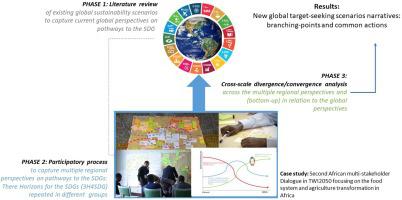Global Environmental Change ( IF 8.9 ) Pub Date : 2020-11-16 , DOI: 10.1016/j.gloenvcha.2020.102198 Ana Paula D. Aguiar , David Collste , Zuzana V. Harmáčková , Laura Pereira , Odirilwe Selomane , Diego Galafassi , Detlef Van Vuuren , Sander Van Der Leeuw

|
The United Nations 2030 Agenda catalysed the development of global target-seeking sustainability-oriented scenarios representing alternative pathways to reach the Sustainable Development Goals (SDGs). Implementing the SDGs requires connected actions across local, national, regional, and global levels; thus, target-seeking scenarios need to reflect alternative options and tensions across those scales. We argue that the design of global sustainability-oriented target-seeking scenarios requires a consistent process for capturing multiple and contrasting perspectives on how to reach the goals, including the perspectives from multiple scales (e.g. local, national, regional) and geographic regions (e.g. the Global South). Here we propose a novel approach to co-design global target-seeking scenarios, consisting of (a) capturing global perspectives on pathways to the SDGs through a review of existing global scenarios; (b) a multi-stakeholder process to obtain multiple sub-global perspectives on pathways to sustainability; (c) an analysis of convergences, and crucially, divergences between global and regional perspectives on pathways to reach the SDGs, feeding into the design of new target-seeking scenario narratives. As a case study, we use the results of the 2018 African Dialogue on The World in 2050, discussing the future of agriculture and food systems. The identified divergent themes emerging from our analysis included urbanization, population growth, agricultural practices, and the roles of different actors in the future of agriculture. The results challenge some of the existing underlying assumptions of the current sustainability-oriented global scenarios (e.g. population growth, urbanisation, agricultural practices), indicating the relevance and timeliness of the proposed approach. We suggest that similar approaches can be replicated in other contexts to better inform the process of sustainability-oriented scenario co-design across scales, regions and cultures. In addition, we highlight the implications of the approach for scenario quantification and the evolution of modeling tools.
中文翻译:

共同设计全球目标寻求方案:跨尺度的参与性过程,以获取关于可持续发展途径的多种观点
《联合国2030年议程》推动了全球寻求目标的,以可持续性为导向的设想方案的发展,这些方案是实现可持续发展目标的替代途径。实施可持续发展目标需要在地方,国家,地区和全球各级采取相联的行动;因此,目标寻求方案需要反映这些规模上的替代选择和紧张关系。我们认为,针对全球可持续发展的目标寻求方案的设计需要一个一致的过程,以捕获关于如何实现目标的多种不同观点,包括来自多个尺度(例如本地,国家,区域)和地理区域(例如全球南方)。在这里,我们提出了一种新颖的方法来共同设计全球目标寻求方案,包括:(a)通过审查现有的全球情景,掌握关于实现可持续发展目标途径的全球观点;(b)多利益相关方过程,以获取关于可持续发展途径的多种次全球观点;(c)分析达成可持续发展目标途径的全球观点和区域观点之间的趋同,最重要的是,对观点的分歧,从而有助于设计新的目标寻求情景说明。作为案例研究,我们使用了2050年2018年非洲世界对话的结果,讨论了农业和粮食系统的未来。从我们的分析中发现的不同主题包括城市化,人口增长,农业实践以及不同参与者在农业未来中的作用。结果挑战了当前以可持续性为导向的全球情景的一些现有基础假设(例如人口增长,城市化,农业实践),表明了拟议方法的相关性和及时性。我们建议可以在其他情况下复制类似的方法,以更好地指导跨规模,地区和文化的面向可持续性的场景协同设计过程。此外,我们重点介绍了该方法对方案量化和建模工具演变的影响。我们建议可以在其他情况下复制类似的方法,以更好地指导跨规模,地区和文化的面向可持续性的场景协同设计过程。此外,我们重点介绍了该方法对方案量化和建模工具演变的影响。我们建议可以在其他情况下复制类似的方法,以更好地指导跨规模,地区和文化的面向可持续性的场景协同设计过程。此外,我们重点介绍了该方法对方案量化和建模工具演变的影响。



























 京公网安备 11010802027423号
京公网安备 11010802027423号